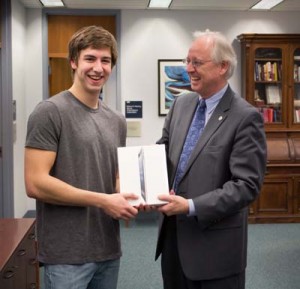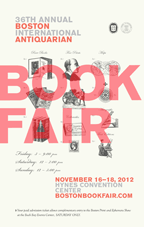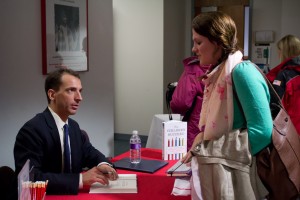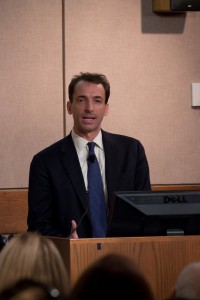Co-op Reflections: Our Time at Snell
As the semester comes to an end, so do two co-ops in Snell Library. I have been working as the marketing and events planner, and Brittany Tassone has been working in the Digital Media Commons Studio. We have taken some time to think back on our experience here and offer advice to the new co-ops that will take our place in January.
Thank you to Snell Library and our co-workers for two great co-op experiences. – Jen
Jen:
As the marketing and events co-op I planned Meet the Author events, assisted library staff with many other projects and events, and used Snell’s social media pages to promote library happenings and communicate with the Northeastern community. I gained a lot of marketing experience from this co-op. The Northeastern community is very diverse, and it was valuable for me to have to promote events and campaigns to such an audience. As a Northeastern student, I benefitted from working with different academic departments and student groups, and I feel much more connected to my university as a result.
I was not sure what to expect at an on-campus co-op, but it turned out to have been an incredible advantage. I was able to have more freedom and work on a wide range of projects at Snell, and was never stuck with boring or repetitive tasks. My favorite things about this job are that that I did something different every day, gained such a wide spectrum of experience, and got to work with a great group of people.
My advice to the next Marketing and Events co-op is to get the most that you can out of working in this position. If you have a good deal of experience when you start, then take on a bit more and come up with new ideas for events and promotions. Also, stay organized and be confident!
Brittany:
My co-op experience at the DMCS definitely was a good fit for me professionally. I was able to use my creative skills and design some unique promotional material, motion, and website graphics, but I was also able to assist in other student’s project, providing them with help that was crucial for it to be the best itcould be. I did experience some trials during my work, and learned that in the business of customer service you definitely need a lot of patience, and willingness to help. Those are qualities that I feel I possess, making my position here definitely a benefit for the DMCS. Having people that don’t necessarily speak English, or don’t have a large knowledge base about design software could be frustrating at times, but working with different types ofpeople is a lesson that I feel everyone should learn. It was beneficial for me because I know in the future I will definitely have to work with all types of different people to create designs for the intended audience.
The best part about working at the DMCS would have to be the great atmosphere my superiors and co-workers created for me. I was able to work on my designs without a huge rush on time, making the transition into my first co-op comfortable for me. My advice to future co-ops would to be to practice using the design software like Adobe Suite, Final Cut, and the iLife suite, as much as possible. It will be very helpful when answering questions in the future.




